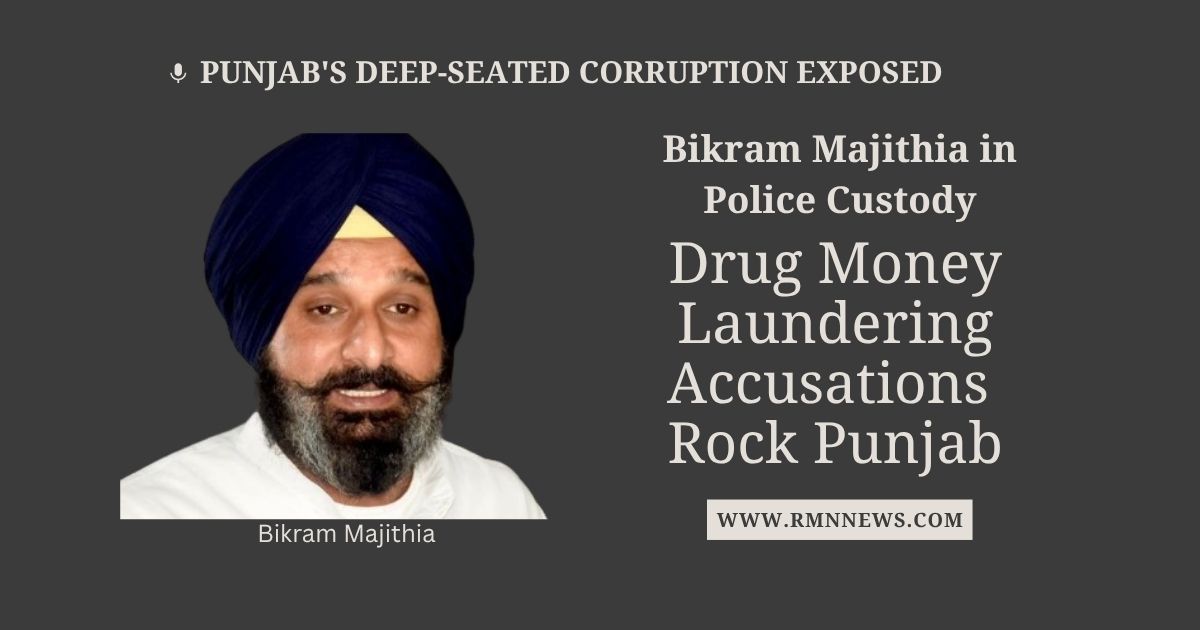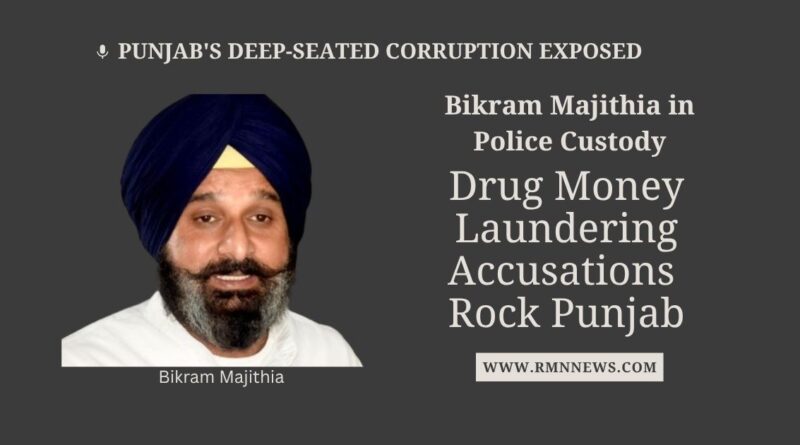Punjab’s Criminal-Political Nexus: The Majithia Drug Case

Punjab’s Criminal-Political Nexus: The Majithia Drug Case
This article details the arrest and ongoing investigation of former Punjab Minister Bikram Majithia in a substantial drug money laundering case, alleging a Rs 540 crore scam.
By RMN News Service
June 27, 2025
Here are the critical questions and answers:
What is the central issue highlighted by Bikram Majithia’s arrest?
The arrest of former Punjab Minister Bikram Majithia on June 25, 2025, exposes a deep-seated criminal-political nexus in Punjab, specifically focusing on a massive drug money laundering operation.
Investigations suggest Majithia facilitated the laundering of over Rs 540 crore in drug money, with illicit funds funneled into his controlled companies, routed through foreign entities, and found as unexplained excess deposits. This case is presented as a symptom of pervasive corruption involving politicians, police, and a compromised judiciary in the state.
How widespread is the complicity in Punjab’s drug trade?
Reports indicate that complicity in Punjab’s illegal drug trade is alarmingly widespread and deeply entrenched. It implicates politicians from both ruling and opposition parties, as well as high-ranking police officials. The Punjab and Haryana High Court has explicitly stated the existence of a criminal collusion between the Punjab Police and the drug mafia, even noting the suspicious absence of police witnesses in drug cases, suggesting they operate “hand in glove” with criminal syndicates.
What specific financial allegations are made against Bikram Majithia?
Majithia is accused of orchestrating a “massive laundering of drug money” estimated at over Rs 540 crores. This includes Rs 161 crores funneled into bank accounts of companies under his direct control, Rs 141 crores routed through suspected foreign entities, and Rs 236 crores found as unexplained excess deposits in company financial statements. Additionally, he faces a disproportionate assets (DA) case for illicitly acquiring movable and immovable assets without legitimate income sources.
How have Majithia and his political party responded to the arrest and allegations?
Majithia and the Shiromani Akali Dal (SAD) leadership have vehemently denounced the arrest, portraying it as a “political vendetta” orchestrated by the Aam Aadmi Party (AAP) government. Majithia and his wife accuse the Vigilance Bureau of intrusive raids, while SAD chief Sukhbir Singh Badal and other leaders have launched a “vitriolic assault” on the AAP government, claiming it’s a “drama to divert people’s attention from corruption” and even drawing parallels to the Emergency period.
What broader issues of corruption in India does Majithia’s case exemplify?
Majithia’s case is presented as a microcosm of systemic corruption in India. The RMN News report highlights several related issues: widespread disproportionate assets among politicians across parties, politicians using public issues to deflect from financial crimes, the “virtual acquittal” of influential politicians through bail, rampant judicial corruption where judges are allegedly bribed to grant bail, luxurious treatment for affluent jailed politicians, and the alleged protection of corrupt members within the ruling BJP.
[ Video: ਗ੍ਰਿਫ਼ਤਾਰ ਬਿਕਰਮ ਮਜੀਠੀਆ: ਨਸ਼ੀਲੇ ਪਦਾਰਥਾਂ ਦਾ ਅਪਰਾਧੀ ਜਾਂ ਇਮਾਨਦਾਰ ਸਿਆਸਤਦਾਨ? ]
What is the critique of the anti-corruption efforts and the judiciary in India?
The RMN News report critically views India’s anti-corruption efforts as consistently failing to build “watertight cases,” allowing criminals to weaponize “politically motivated” rhetoric.
The judiciary is heavily criticized for its “deeply disturbing trend” of granting bail to influential politicians, effectively leading to “virtual acquittal.” Furthermore, it alleges widespread judicial corruption, with judges taking bribes, and senior lawyers acting as intermediaries in “bribe for bail” schemes. Poor prisoners, in contrast, “languish in jails” without trials.
How does the report criticize the Aam Aadmi Party (AAP) government in Punjab?
The report alleges that AAP politicians from Delhi have seized “absolute control” in Punjab, reducing CM Bhagwant Mann to a “mere figurehead.” It claims that most AAP politicians in Punjab have amassed disproportionate assets and that a proper investigation into the “Punjab liquor scam” would lead to the prosecution of many, including Bhagwant Mann.
The report also suggests a “sordid collusion” between the Bhagwant Mann government and the central Modi regime to avoid investigating the liquor scandal and to “terrorize protesting Punjab farmers and activists.”
What is the grim prediction for the outcome of Majithia’s case and similar high-profile corruption cases?
The report predicts a “looming farce of justice” for Majithia. Despite the extensive allegations, it grimly states that “rich Majithia will also be soon released without forfeiting any of his wealth or properties” and will “enjoy full luxury in jail” if confined.
This outcome is attributed to the widespread practice of “bribe for bail” in Indian courts, facilitated by a “cabal of senior lawyers-cum-politicians” who allegedly bribe judges. The ultimate prediction is that justice remains a “cruel joke for the ordinary citizen,” while the powerful “buy their freedom with impunity.”
💛 Support Independent Journalism
If you find RMN News useful, please consider supporting us.




